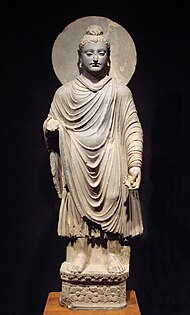Indian philosophy
However, there are other methods of classification; Vidyaranya for instance identifies sixteen schools of Indian philosophy by including those that belong to the Śaiva and Raseśvara traditions.
Ancient and medieval era texts of Indian philosophies include extensive discussions on ontology (metaphysics, Brahman-Atman, Sunyata-Anatta), reliable means of knowledge (epistemology, Pramanas), value system (axiology) and other topics.
[16] Some of the earliest surviving Indian philosophical texts are the Upanishads of the later Vedic period (1000–500 BCE), which are considered to preserve the ideas of Brahmanism.
The origins of Jainism remain enigmatic, with scholarly consensus divided between pre-Vedic roots, parallel development alongside Vedic civilization or post-Vedic emergence.
[18] Doubts about Parshvanatha's historicity are also supported by the oldest Jain texts, which present Mahavira with sporadic mentions of ancient ascetics and teachers without specific names (such as sections 1.4.1 and 1.6.3 of the Acaranga Sutra).[19].
[22] Hindu philosophy classify Indian philosophical traditions as either orthodox (āstika) or heterodox (nāstika), depending on whether they accept the authority of the Vedas and the theories of brahman and ātman found therein.
[28] Other Hindu sources argue that certain systems of Shaiva tantra should be considered heterodox due to its deviations from the Vedic tradition.
[29] One of the most common list of Hindu orthodox schools is the "six philosophies" (ṣaḍ-darśana), which are:[30] Sometimes these six are coupled into three groups for both historical and conceptual reasons: Nyāya-Vaiśeṣika, Sāṃkhya-Yoga, and Mīmāṃsā-Vedānta.
[33] Hindu philosophers of the orthodox schools developed systems of epistemology (pramana) and investigated topics such as metaphysics, ethics, psychology (guṇa), hermeneutics, and soteriology within the framework of the Vedic knowledge, while presenting a diverse collection of interpretations.
These non-Vedic schools gave rise to a diverse range of ideas about topics like the atman, atomism, ethics, materialism, atheism, agnosticism, free will, asceticism, family life, ahimsa (non-violence) and vegetarianism.
As karma accumulates, the soul becomes bound to the cycle of birth and rebirth, perpetuating a continuous journey of suffering and ignorance, until it ultimately attains liberation through self-realization (atma-anubhuti).
Jainism places strong emphasis on asceticism, ahimsa (non-violence) and anekantavada (relativity of viewpoints) as a means of spiritual liberation, ideas that influenced other Indian traditions.
[52] Buddhist philosophy refers to several traditions which can be traced back to the teachings of Siddhartha Gautama, the Buddha ("awakened one").
[59][60] A major departure from Hindu and Jain philosophy is the Buddhist rejection of an eternal soul (atman) in favour of anatta (non-Self).
[56][61][62][63][64] After the death of the Buddha, several competing philosophical systems termed Abhidharma began to emerge as ways to systematize Buddhist philosophy.
[75] Ājīvikas were atheists[76] and rejected the authority of the Vedas, but they believed that in every living being is an ātman – a central premise of Hinduism and Jainism.
[79] Charvaka holds direct perception, empiricism, and conditional inference as proper sources of knowledge, embraces philosophical skepticism and rejects ritualism and supernaturalism.
[86][87] During the Hindu reformation period in the first millennium BCE, when Buddhism was established by Gautama Buddha and Jainism was re-organized by Parshvanatha, the Charvaka philosophy was well documented and opposed by both religions.
[89][90] However, there is text that may belong to the Charvaka tradition, written by the skeptic philosopher Jayarāśi Bhaṭṭa, known as the Tattvôpaplava-siṁha, that provides information about this school, albeit unorthodox.
[91][92] One of the widely studied principles of Charvaka philosophy was its rejection of inference as a means to establish valid, universal knowledge, and metaphysical truths.
The Kural text, attributed to Valluvar and dated to around 5th century CE, deals with ahimsa and morality, extending them to political philosophy and love.
[148]: 7–16 [149]: 156–168 The political philosophy most closely associated with modern India is the one of ahimsa (non-violence) and Satyagraha, popularised by Mahatma Gandhi during the Indian struggle for independence.
[151] Integral humanism was a set of concepts drafted by Upadhyaya as political program and adopted in 1965 as the official doctrine of the Jan Sangh.
[citation needed] Upadhyaya considered that it was of utmost importance for India to develop an indigenous economic model with a human being at center stage.
In the preface to his book The World As Will And Representation, Schopenhauer writes that one who "has also received and assimilated the sacred primitive Indian wisdom, then he is the best of all prepared to hear what I have to say to him.





